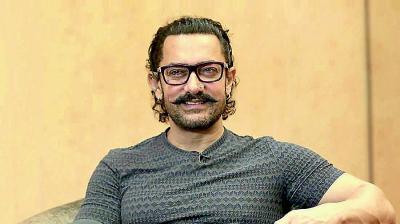Shame game
The obsession with body beautiful is resulting in a compulsive shame fest. And nobody is spared.
Perfection is tough to measure up to, and there’s often a price to pay if you fall short. In the present world obsessed with the concept of perfect beauty, the price is shame.
What is a perfect body? Skinny? No, that invites skinny-shaming... then there’s fat-shaming, short-shaming, tall-shaming... there’s also skin tone shaming, slut shaming, and all other kinds of shaming that measures people against a widely accepted but quite unrealistic body image paradigm, and finds them wanting. Social media feed is flooded with the destructive emotion of shame as almost everybody is body shamed — from celebrities like Deepika Padukone, Shruti Haasan, Kriti Sanon, Vidya Balan, Hilary Duff, Mariah Carey, Rihanna, Emma Watson, to non-celebs.
 Deepika Padukone was skinny-shamed for her Vanity Fair cover
Deepika Padukone was skinny-shamed for her Vanity Fair cover
Is there any one perfect template of beauty? And why is the obsession with body beautiful resulting in a compulsive shame fest?
Beauty stereotypes
True beauty is something individual rather than conforming to unrealistic ideals of body shapes and attributes, believes designer Archana Kochhar.
Noted for including people from different backgrounds or nodels (non-models) to walk the ramp for her, she feels ‘everyone is beautiful the way they are’, and people matter, not clothes, not fashion, not a trend or a so-called beauty standard. “I strongly believe that beauty should not be stereotyped. I am personally working towards this concept of all-inclusive beauty and supporting the initiative of Bring Beauty Back. I believe that beauty is not external but it’s something that comes from within. Fashion weeks are platforms which are considered benchmarks for beauty. Hence, it is imperative to promote the concept of ‘inclusion of all forms of beauty’ on such platforms to change stereotypical thinking. Beauty should not be affirmed by a certain height, colour or size, it is beyond that. It should be an all-inclusive concept,” she says.
 Disha Patani was shamed for showing cleavage
Disha Patani was shamed for showing cleavage
Hitting back
One of the latest celebrities to be attacked by trolls, Hilary Duff, who was shamed for her “flaws” — dimples or cellulite on her backside — sent out a strong message: “Since websites and magazines love to share ‘celeb flaws’ — well, I have them! My body has given me the greatest gift of my life: Luca, five years ago. I’m turning 30 in September and my body is healthy and gets me where I need to go. Ladies, let’s be proud of what we’ve got and stop wasting precious time wishing we were different, better, and unflawed. You guys (you know who you are!) already know how to ruin a good time, and now you are body shamers as well.”
Actress Neha Dhupia, one of the most vocal celebs, strongly believes one should hit back. “Being frank is a way to be and for a decade now, we all have been advocating ‘being yourself’. Today, we are targeting body shaming. Five years from now, body shaming will be equivalent to apartheid where if you call someone fat or thin, you will be punished.”
 Hilary Duff hit back at her trollers with the above picture on Instagram
Hilary Duff hit back at her trollers with the above picture on Instagram
Shaming spectrum
It’s not just the body that’s been shamed online. As a society, we have become really good at shaming others for how they look, what they wear, where they live, who they date, and even how they eat. Director and chat show host Karan Johar, who, in his book An Unsuitable Boy, mentioned how he cannot openly talk about his sexual orientation because of how intolerant our society is, continues to get trolled for his sexual orientation. KJo hit out at the trolls constantly shaming him for various aspects. Taking to Twitter, the 45-year-old wrote. “You don’t need to be arrested for gay shaming... body shaming... slut shaming... any shaming... because you are already living in a jail....”
And, who can forget cricketer Irfan Pathan getting shamed for posting his wife’s “un-Islamic” photo? Also Fatima Sana Shaikh came in the line of Internet fire for her bikini shoot in the month of Ramzan, as did Sonam Kapoor and Disha Patani for showing a bit of cleavage.
 Sonam Kapoor came in the line of Internet fire for showing a bit of cleavage
Sonam Kapoor came in the line of Internet fire for showing a bit of cleavage
Psyche of shaming
According to doctors and mental health specialists, in every person who engages in body shaming, there is deep-rooted anxiety about what his or her target represents. Studies have shown that their expression of self-love shatters the ideology of perfection, exposing weakness and lack of control in worshippers of beauty ideals. Shaming others is a power play that serves to distract and avoid anxiety. People with low self-esteem, those who have gone through a disturbed environment during childhood, a personality pre-disposed to underlying anxiety, peer pressure, pressure of living up to social standards that we create are usually the ones who indulge in shaming.
And for the victim, the criticism can cause sharp emotional and psychological bruises. About the psychological cost of shame, Dr Sameer Malhotra, director and senior consultant psychiatrist, psychotherapist and drug de-addiction specialist, department of Mental Health and Behavioural Sciences, Max Hospitals, India, says, “It disturbs the cost of life. The person may suffer from social anxiety, nightmares, depression and phobia. One could also be driven to suicidal thoughts and behaviour. One needs to evolve internally to cope with the pressure. One needs a problem-solving approach, rather than getting entrapped in social standards. One needs timely and sensitive handling of victims of shame by parents and families.”
Celeb tales
If celebs are some kind of symbols to some people out there, then clearly, they are an example of the lens through which we, as a society, view our mothers, daughters, sisters, wives, female friends and colleagues. However, if the message that girls are not pretty unless they’re incredibly thin or that they’re not worthy of attention unless they look like a supermodel is something that’s seriously unsettling.
 Rihanna wore an off-the-shoulder, fiery red ball gown and the Internet went crazy over her body weight
Rihanna wore an off-the-shoulder, fiery red ball gown and the Internet went crazy over her body weight
TV actress Sonarika Bhadoria, who is better known for her portrayal of Goddess Parvati in a serial, was trolled and shamed badly when she posted pictures in a bikini. She deleted the pictures at first, but then decided to re-post them. Almost a year has passed since and she says that the incident made her stronger. “It was a casual picture. I didn’t think it was vulgar or anything and all of a sudden, people were abusing my family members and me. They said the meanest things possible. We were being bullied 24x7. There were rape and death threats as well. It was a really bad phase,” she recalls.
Sonarika says she is a fearless person and doesn’t get intimidated easily. However, the incident disturbed and saddened her. Over the months, she has been posting equally beautiful pictures. Isn’t she afraid of another backlash? “Now I post a picture if I feel like sharing a moment from my life. I don’t read the comments.”
 Actress Sonarika Bhadoria, who played Goddess Parvati in a serial, was trolled when she posted pictures in a bikini
Actress Sonarika Bhadoria, who played Goddess Parvati in a serial, was trolled when she posted pictures in a bikini
“I can’t find the trolls and hit them. The best way is to ignore till there is a provision in place to bring them to book,” she says. She draws attention to the fact that it’s not only women who get shamed but men as well, of all age groups. Giving an example she adds, “I have seen how men with great bodies always get to hear that yeh toh steroids khake hai. All these are classic cases of sour grapes. Shaming should stop but what can we do? The Internet has given us so much power but taken away a lot as well. Now you can hide behind a social media account and say whatever you can. There should be a system which ensures people are accountable and punishable.”
Perfecting perfection
For humankind, the idea of perfection has always been a fleeting concept, one that always seems slightly beyond our reach, feels Shahnaz Husain, the beauty industry doyen. “My idea of beauty is to celebrate your individuality, constantly working on being a better you, rather than comparing yourself with others. For me, the most beautiful woman is the one who is comfortable in her skin, confident, valuing herself for who she is. This is what helps her take care of herself, working on her fitness and her health, caring for herself with the right internal and external care. I find that when a woman is proud of her individuality, she emanates a certain radiance that makes her seem more alive and attractive than a woman with those ‘classic’ features. A beautiful woman is not like a painting on the wall, to be admired from afar. She is a real and vital person, who, through her interaction with others, leaves behind the lingering fragrance of her personality.”
Adman Prahlad Kakkar believes, “The perfect body is what you think is perfect and not what others tell you. The problem is we allow ourselves to believe others’ concept of perfection. Also, we are too lazy to work towards something we think is ideal.”
 Actress Aneri Vajani was slammed for being thin
Actress Aneri Vajani was slammed for being thin
Celebrity stylist Pooja Gulbani agrees and feels that we need to understand that there’s no prototype of a perfect body mainly because we all desire different things. “We always tend to focus on what we don’t have instead of focusing on what we’re naturally blessed with. We need to figure out how we can use it to our advantage and enhance it further. In fact, we should all decide collectively that we’re all beautiful in our own way. By appreciating one another, we empower each other, making us all feel more confident in our own skin,” she says.
Key culprits
A recent study ranked Instagram and Snapchat as the worst social platforms for body image, though Instagram had good marks for self-expression, self-identity and emotional support. Brand strategist Harish Bijoor blames advertising and cinema for the growing incidence of body shaming. He says, “The two culprits for body shaming are advertising and cinema because these are mass cultural mediums which tend to define people’s thinking. Indian cinema has stereotyped body image for a long period of time. If you study cinema from the ’60s, you will see that there have been different kinds of stereotyping in every decade. Similarly, advertisers use that imagery, which have defined certain stereotypes. Advertising respects and appreciates only one kind of body form. Therefore, prototyping and stereotyping of body types takes place.” But doesn’t that make filmmakers and advertisers liable to a social responsibility of not advocating such propaganda? “Advertisers and filmmakers follow the same propaganda because they know that people live through the life of their ‘stars’. People have a vicarious style of living where they know they are a certain kind, but they want to be like their dream actors. And till this vicarious living exists, advertising and filmmakers will not change,” he says.
Bijoor believes that rigid definitions of what is appealing and not appealing, what is fashionable and not fashionable, have eroded the openness and inclusiveness in the appreciation of beauty and body. He says, “Every person’s idea of appreciation of a body is different. Colonisation of attitude must be avoided at all costs. There is no reason why everyone should appreciate only one kind of a body form.”
Anything can be beautiful to anyone. And anyone can be their own kind of beautiful. And this, perhaps, is the true beauty of beauty.
Body beautiful
Adman Prahlad Kakkar takes a walk down history to explain how certain body types became the beauty norm. He says, “In the 1960s, gay people came out of the closet and took over the fashion industry. They then decided to take revenge on the straight people. They found a girl who looks exactly like a skinny boy and made her a supermodel of the era. Her name was Twiggy. Men are generally completely fascinated by women’s breasts and Twiggy left them confused. It started the era of ‘No T&A’ (t*ts and a*s) models. This went on for 30 years till in the late ’90s when Jennifer Lopez came and changed the trend. So, two different eras considered two different body types as beautiful. People must understand they both, Twiggy and JLo body types, are fraud. The normal is the one we see in various ancient structures where women had potbellies, thunder thighs and drooping breasts. In America, every second person is obese but they consider thin body type as the norm. At the end of the day, it’s about the individual and what he thinks and feels about himself. I am not good-looking but I have a great sense of humour. I wear what I wish but people think I am a fashionista because I wear different things. You can either improve or ruin your looks but you can’t run away from who you are. You can grow your paunch but then you might not get laid. If you are happy with it, where’s the problem? It’s more important and permanent to penetrate the mind than the body. Body keeps changing with time but what is in your mind lasts long. Once you have mental power, body types won’t matter. People will think of you as what you think of yourself.”



















